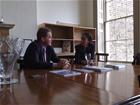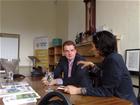Between numbers and reality
Adelina Marini, May 26, 2011
The most debated news in Ireland last week, which managed to break through in media in spite of the historical visit of the British Queen, was a very worrying statement of the International Monetary Fund about Ireland's situation, accompanied for the first time by a warning to the entire European Union. On May 20 in a press release the Fund pointed out that the problems Ireland was facing were not an Irish problem only, "they are a shared European problem that requires a  shared solution". The head of the IMF's Irish team Ajai Chopra also thinks that "European partners need to make clear that for all countries currently with programs there will be the right amount of financing, on the right terms, and for the right duration to foster success".
shared solution". The head of the IMF's Irish team Ajai Chopra also thinks that "European partners need to make clear that for all countries currently with programs there will be the right amount of financing, on the right terms, and for the right duration to foster success".
The unusual, in terms of a tone, statement of the institution, which participates with funding in the bailout programmes of Ireland, Greece and Portugal, momentarily caused speculations in Ireland that an incapability of the country to pay its debts was inevitable. This is what Ivan Yates said, a former minister in the Fina Gael government, at a conference of the small business on May 20th, quoted by The Irish Times. The news raised fears that the removal of IMF's boss Dominique Strauss-Kahn for alleged attempted rape, could additionally complicate the situation of the country, as it is suggested that he was a very active  participant in the bailout programmes of the troubled countries. "... far more closely involved than is normal for a managing director", as Gary O'Callaghan wrote in the business supplement of The Irish Independent.
participant in the bailout programmes of the troubled countries. "... far more closely involved than is normal for a managing director", as Gary O'Callaghan wrote in the business supplement of The Irish Independent.
But how do things look like on the ground?
Unemployment is high - around 14.5%, it has increased drastically only in two years and a half from 5%, says the Deputy Chief Executive of Chambers Ireland - Sean Murphy. My conversation with him is dominated by the economic situation of his home land, but nonetheless he radiates some kind of a very special optimism. According to him, two are the main sectors which, just provisionally, the Irish economy could be divided into - the domestic one and the internationally traded one. The former is entirely dependent on domestic demand, which is in decline, as, Mr Murphy also tells me, people and businesses are concentrated on paying off their debts.
 The second sector however, the internationally traded, one is thriving. Something, which has been confirmed by many people, doing business entirely outside Ireland, expecting their business to grow this and next years.
The second sector however, the internationally traded, one is thriving. Something, which has been confirmed by many people, doing business entirely outside Ireland, expecting their business to grow this and next years.
Of course it was inevitable that we discuss the issue of the corporate tax - its increase was one of the main things Dublin had to do in order to get a reduction of the interest rate on its bailout with the EU. As you know the country has received a bailout of 85 bn euro from the EU and the IMF, a significant part of which is aimed at rescuing the bank sector. An increase of the corporate tax, however, is a condition which no one on the "green island" is willing to accept. Sean Murphy was firm that putting this condition practically meant that the creditors did not want their money back. (The entire interview with Mr Murphy you can watch in the video file above).
"So those that are demanding an increase in our corporation tax rates are clearly, if that happens, threatening that potential growth rate. And that has a direct impact on the sustainability of Ireland's ability to pay down our debt. We've taken on a very very significant burden to bailout our banks. A greater burden than the impact of the tsunami and nuclear radioactive leaks in Japan for a population of four million people. So, you know, those that are advocating that change, it might well work with their domestic voters, but if they are looking for sustainability of payment ability on those debts to the ECB and other creditors, than it is illogical", Mr Murphy tells me. There is no discord on the matter among the rest whom I spoke with in Dublin, and also in what I heard and read in the local media.
tells me. There is no discord on the matter among the rest whom I spoke with in Dublin, and also in what I heard and read in the local media.
For now it seems that the country will evade the increase of the corporate tax. At the euro area summit on March 11 the new Prime Minister of Ireland, Enda Kenny, received an ultimatum by March 25 (when was the regular Spring European Council) to answer whether the country was ready to at least debate an increase of the corporate tax, which is currently 12.5%, in order to get a 1% reduction of the interest rate, like Greece. The issue, however, dropped out of the agenda of the spring council because of the last agreements on the Euro+ Pact and the European Stability Mechanism (ESM).
At the last Ecofin (the Council of the ministers of finance of the Eu) a decision in principle had been agreed, although there is no specific agreement for the Irish rate. It is expected the matter to be finalised at the June European Council, when the agreements for changes in the temporary rescue fund for the euro area will be discussed (the EFSF) and the creation of the permanent European Stability Mechanism.
 The main problem of the small country with a population of 4.6mn people is the banking system, which is not capable currently to lend for the business. Moreover, as Sean Murphy tells me, not a few foreign banks are withdrawing their deposits from the country, thus draining the already low liquidity. Mr Murphy, however, is an optimist. According to him, there are not few countries who have achieved a 13% pay cut of public servants and are ready to do it again. The Irish society has an understanding about the pain it should go through. No protests, no strikes.
The main problem of the small country with a population of 4.6mn people is the banking system, which is not capable currently to lend for the business. Moreover, as Sean Murphy tells me, not a few foreign banks are withdrawing their deposits from the country, thus draining the already low liquidity. Mr Murphy, however, is an optimist. According to him, there are not few countries who have achieved a 13% pay cut of public servants and are ready to do it again. The Irish society has an understanding about the pain it should go through. No protests, no strikes.
"Only one is the country that has done this before - Germany. I think the opportunities are there for us to progress. But this is based on certain requirements like gravity, and one of them is sustaining our corporation tax rate. It's a key issue for us, we've had since the 1950s. 25 years before we joined the European Union we've had a low corporation tax rate for manufacturing operators here. It's a tradition here. And, again, that is something that we will very much significantly  defend as best as we can", adds in conclusion the deputy chief of Chambers Ireland.
defend as best as we can", adds in conclusion the deputy chief of Chambers Ireland.
And one more very important thing, in Ireland people do not worry when they have to work more. They have sometimes several jobs, they are innovative, constantly thinking of development. And no less important - they have a positive demographic picture, which means that in the long run the public finances are not at risk. The only challenge is banks to be able to step on their feet. However, this can happen only if the European Central Bank would continue financing them. As the IMF points out, it is necessary to secure mid-term funding of the Irish banking system, in order to help the process of returning to market financing.
Everything will depend, though, most of all on Greece, as the Fund acknowledges: "Financial market conditions are more adverse, with spreads at unsustainable levels. This is due in large part to the continued uncertainty surrounding other euro area countries, most notably Greece". But in spite of the possibility Ireland to become a hostage of Greece, people whom I spoke with continue to be optimists and to say - yes, we have all started from a different starting point. We need each other. More than ever, I would add, but let's have, just in case, in mind who and when will go too far and who will, after all, pay the bill.
 Klaus Regling | © Council of the EU
Klaus Regling | © Council of the EU Mario Centeno | © Council of the EU
Mario Centeno | © Council of the EU Mario Centeno | © Council of the EU
Mario Centeno | © Council of the EU Angela Merkel, Emmanuel Macron | © Council of the EU
Angela Merkel, Emmanuel Macron | © Council of the EU Benoit Coeure | © Council of the EU
Benoit Coeure | © Council of the EU Pierre Moscovici | © Council of the EU
Pierre Moscovici | © Council of the EU